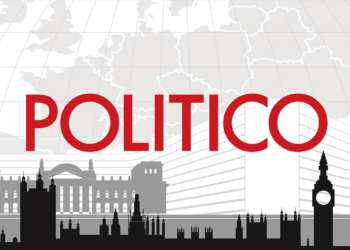BRUSSELS — Business travel bookings from Europe to the United States crashed by more than a quarter in April compared to the same month in 2024, a sign of the widening collapse of positive views of America under Donald Trump.
Data shared with POLITICO by London-based HotelHub, a platform specialized in the business travel sector, found that bookings in April were down by 26 percent from a year ago. That comes as the U.S. is seeing a marked deterioration in its reputation; Trump has unleashed a global trade war and is attacking traditional U.S. allies while social media is filled with stories of travelers being mistreated while trying to enter the country.
“There’s been a lot of uncertainty around the traditional partnership with the U.S. since the new administration took office and even more so since the tariff announcements,” said Paul Raymond, HotelHub’s chief commercial officer.
The sweeping tariffs introduced by the Trump administration “seem to have created an appetite for businesses to look at alternative markets to offer greater stability,” Raymond added.
Companies worldwide are staying away from an increasingly unwelcoming U.S. HotelHub data shows international business travel hotel bookings to the U.S. decreased by 19.3 percent in April, while overall U.S. bookings including domestic stays were down 15.6 percent.
Some European countries are seeing dramatic falls in U.S. business travel.
Germany was down 30.4 percent, France fell 22.4 percent and the U.K. dropped by 14.4 percent.
Travel to the U.S. is also cratering from Mexico and Canada, two of America’s closest trade partners hit with high tariffs; Trump has also made threats about Canada’s independence. Mexican business bookings were down by 18.8 percent and Canada fell by 18.1 percent.
“The real challenge is the inconsistency in messaging that businesses are receiving from the U.S.,” Raymond said. “If you have to think twice about doing business in a specific region, it is probably easier to look elsewhere.”
HotelHub shared where European companies have been diverting their business trips since Trump’s return to the White House.
From Jan. 1 to April 30, the countries that saw the most significant increases in European bookings were Norway (up 23.3 percent), Turkey (up 19.3 percent), Australia (up 18.9 percent), Japan (up 10.1 percent) and India, with a gain of 7.2 percent.
The steep fall in U.S. bookings is an outlier compared to other markets.
HotelHub said in its written answers that the overall number of bookings originating in Europe for the first four months of the year dropped slightly by 1.6 percent compared with the same period in 2024, so changes in country preferences are not due to a significant spike or fall in the overall volume of bookings.
“Anecdotally, we have also heard that European travelers are growing increasingly hesitant about traveling to the U.S., which may also have a bearing on where employees are willing to go,” said Raymond, referring to the leisure travel sector, which HotelHub does not cover.
Last week, the World Travel & Tourism Council, an industry lobby, estimated $12.5 billion would be lost in international visitor spending in the U.S. in 2025.
The lobby’s latest Economic Impact Research showed a 6.9 percent decline in international visitor spending, from $181 billion in 2024 to $168.7 billion this year, sounding the alarm for U.S. tourism.
The document — first reported by the New York Times — doesn’t spell out which countries are seeing the largest declines in tourists to the U.S.
By contrast, domestic visitor spending is expected to remain stable at about $1.5 trillion — a figure that shows the U.S. tourism industry is nearly 90 percent dependent on domestic travel.
“We absolutely have seen a decline in popularity of foreign travelers coming to the U.S.,” said Ellie Mertz, Airbnb CFO, during the homestay booking platform’s first-quarter earnings call.
“It’s less popular to come to the U.S. from a year ago, also relative to the beginning of the year,” she added.
However, Mertz said, “as a reminder, U.S. travel is predominantly domestic.”
Online travel agency Booking.com also noted a slowdown in U.S. tourism.
“Looking at our room night growth by region in the first quarter, Europe and Asia were up high single digits, rest of world was up low double digits, and the U.S. was up low single digits,” the platform said in its Q1 results.
The post Trump tanks EU business travel to America appeared first on Politico.




